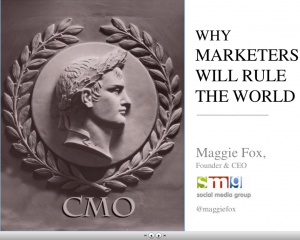Our wonderful Associate Marketing Director (who also happens to run the marketing campaign for our very own eTail conferences), sent me an article last week about how marketer would one day rule the world. As I often do with articles sent to me by colleagues, I clicked the link, then left the window open in my Firefox browser, promising to get to it soon. I have a phobia of closing tabs. I fear that once they’re gone I’ll never find them again. This irrational fear leaves me with no less than 25 tabs open at any given time. BUT every once in a while it pays off. As I go through my weekly tab cleaning spree in hopes to close as many as possible, I sometimes land on a gem that I KNEW would be worth reading some day. (Yeah yeah I know, why don’t I just use bookmarks, right? Let’s not go there…) 
Anyway, I came across this article in Social Media Today, written by Maggie Fox, founder and CEO of Social Media Group, and as I skimmed over it I realized it was not only worth reading, but worth sharing with all you marketers out there.
Says Fox at the start of the article: “We’re entering a new era of big data, automation and the ability to drive business strategy by delivering real-time access to the voice of the customer. Savvy, forward-thinking marketing leaders who “get it” can position themselves to deliver enormous business value and take a seat at the big table if they can figure this stuff out – and keep up.”
Her article also points out that the average lifespan of the CMO has increased from 23 months in 2006 to more than 43 months in 2012. Forbes magazine suggests this is a reflection of the growing strategic nature of the role – there’s enormous opportunity to solidify the position by delivering measurable business results, thanks to big data. By 2017, Gartner analyst Laura McLellan predicts that CMOs will spend more money on technology than CIOs, says the article.
The article points to a recent survey from ITSMA and VisionEdge Marketing which points out the following about marketers:
• 59% don’t specify marketing technology
• 45% don’t recommend marketing technology
• 46% don’t select marketing technology
• 15% DON’T HAVE ANY SAY AT ALL
Fox also mentions a Wall Street Journal story that suggested CIOs, not CMOs, should be responsible for digital leadership, predicting that a new role, Chief Digital Officer, would fall to IT. Russell Reynolds, a recruiting company, describes the CDO as “[someone] who can oversee the full range of digital strategies and drive change across the organization.” In July, Oracle released a survey of more than 300 US and Canadian executives that showed 93% of them believe they’re losing revenue because they aren’t able to access or act on information already available to them.
The opportunity for marketers, says Fox, is to blend the “Art and Science” of marketing; the art being the storytelling (something marketers are typically good at – or should be anyway) and the science is the technology and strategic business value deliverable by leveraging big data generated by social media and other customer interactions online. One of the biggest challenges will continue to be turning unstructured data (so much of what social media produces is “unstructured”) into structured, measurable data. This will require skill sets many firms are unlikely to have in a typical marketing department. McKinsey predicts that in the U.S. alone, right now there’s a need for 200,000 people with skill sets in data analytics. Fox’s article quotes Avinash Kaushik, Google’s digital marketing evangelist, who says that the ideal breakdown for big data resources should be 15% data capture, 20% reporting and 65% analysis. At the moment that’s flipped, with most resources in most marketing departments devoted to capture and very little to analysis and actionable insight.
I found Fox’s article fascinating and totally on point. What do you think, and more importantly, where does your firm fit in this timeline? The question is rhetorical – you needn’t answer it aloud. But you surely should have the answer in your mind so you know where to go, how and when. Check out the link here for her full article and corresponding presentation.




Recent Comments